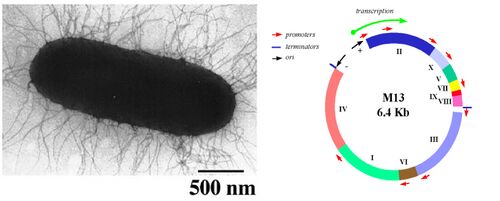20.109:Module 1
Module 1
Instructors: Drew Endy and Natalie Kuldell
TA: Sean Clarke
In this experiment, we will consider the genome of a virus, namely the bacteriophage M13. M13 is a self-assembling nano-machine with a compact genome that has been optimized by evolution to commandeer its bacterial host. Approximately 1000 new viruses are generated from a single infection event. Imagine harnessing this production. What could we build and what natural processes could we better understand? One approach we’ll take is to modify the existing genome in a subtle but useful way, namely by adding a peptide-tag that can be presented on the bacteriophage coat. We’ll examine how this modification affects the coat protein’s expression and overall phage production. Another approach we’ll take is to start from scratch, undertaking a full throttle redesign of the bacteriophage genome. We’ll employ a commercial DNA synthesis company to compile the redesigned genomic program and then we’ll see if it encoded infective M13 and if the genome of the bacterial host affects bacteriophage production. Through these investigations we’ll ask: is nature’s M13 genome “perfect” or can we do better?

Map of M13 genome from M. Blaber
Module 1 Day 1: Start-up genome engineering
Module 1 Day 2: Agarose gel electrophoresis
Module 1 Day 3: DNA ligation and bacterial transformation
Module 1 Day 4: Examine candidate clones
Module 1 Day 5: Western analysis
Module 1 Day 6: Probe western
direct link to 20.109(S07):_Genome_engineering_essay
direct link to M13 refactoring workpage
direct link to hard info for BBa_M1307
